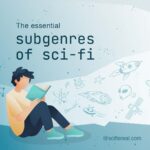News
Selected Science & Sci-Fi news from around the world on the latest in technology, space exploration, artificial intelligence, robots, and everything that leads science fiction to become reality.
Science, Technology & Sci-Fi News (April 2025)
Terrifying study reveals AI robots have passed ‘Turing test’ — and are now indistinguishable from humans, scientists say
Researchers found that, when “prompted to adopt a humanlike persona, GPT-4.5 was judged to be the human 73% of the time.” Interestingly, the experts at Psychology Today concluded that the bots had beaten the Turing Test, not through smarts, but by being a “better” human than the actual humans. (Read more: New York Post)
China advances in brain-computer interface technology, aiming for US$900 per procedure
The semi-invasive system developed by CIBR and its affiliated start-up NeuCyber NeuroTech have completed their first three human implants. A Chinese brain-computer interface (BCI) company said it had seen positive results from three human implants, matching Elon Musk’s Neuralink in the number of human patients, as China prepares for wider commercialisation of the technology. (Read more: scmp.com)
Strange sphere-studded rock on Mars found by NASA’s Perseverance rover
The rock has hundreds of spherules on it, some of which have tiny pinholes. Named “St. Pauls Bay” by the mission team, the Mars rock features hundreds of millimeter-size dark gray spheres, some of which have tiny pinholes. Perseverance discovered this rock on March 11 on the rim of the Jezero Crater, an ancient lakebed that the rover has been exploring since 2021 for signs of past microbial life. Scientists say determining the geological origins of this area’s features could provide valuable insights into how rocks in the region evolved over billions of years. (Read more: Space.com)
Science, Technology & Sci-Fi News (March 2025)
China unveils first homegrown space mining robot. China’s first space mining robot has been developed by the China University of Mining and Technology (CUMT). It not only adapts to the microgravity conditions of space but also navigates the rugged, cratered terrain of asteroids, CCTV News reported on Sunday. The prototype has now filed patents with relevant authorities and successfully cleared preliminary reviews, the report said. (Read more: globaltimes.cn)
‘Brain pacemakers’: implants to be tested to help alcohol and opioid addicts
Trial will determine whether electrical pulses can control and decrease yearnings. Surgeons are to put implants into the brains of alcoholics and opioid addicts in a trial aimed at testing the use of electrical impulses to combat drink and drug cravings. (Read more: The Guardian)
Science, Technology & Sci-Fi News (December 2024)
Interstellar “tunnel” found that connects our solar system to other stars
After years of careful mapping, a new analysis reveals what appears to be a channel of hot, low-density plasma stretching out from our solar system toward distant constellations. (Read more: Earth.com)
First demonstration of quantum teleportation over busy Internet cables
Advance opens door for secure quantum applications without specialized infrastructure. Northwestern engineers have successfully demonstrated quantum teleportation over a fiber optic cable already carrying Internet traffic, introducing the new possibility of combining quantum communication with existing Internet cables. (Read more: northwestern.edu)
Science, Technology & Sci-Fi News (November 2024)
Scientists have fiercely debated the existence of ‘Planet 9’ for a decade. Some say evidence is piling up
Are there hidden planets in our solar system? New technologies, like the powerful Rubin Observatory, brings us closer to answers. Scientists hope a new telescope will have the potential to see deeper into the solar system. In 2025, the Vera C. Rubin Observatory on Cerro Pachón — a mountain in Chile, is expected to go online. The observatory boasts that in the time it takes a person to open up their phone and pose for a selfie, their new telescope will be able to snap an image of 100,000 galaxies, many of which have never been seen by scientists. (Read more: Discovermagazine)
Science, Technology & Sci-Fi News (October 2024)
‘First tree on Mars:’ Scientists measure greenhouse effect needed to terraform Red Planet
New research points to how much you’ve got to jack up the carbon dioxide (CO2) on Mars to support plant growth, to raise the planet’s temperatures just enough for trees to grow. (Read more: Space.com)
Science, Technology & Sci-Fi News (September 2024)
SpaceX launches Polaris Dawn astronauts to attempt world’s 1st-ever private spacewalk
The four-person Polaris Dawn mission launched early this morning (Sept. 10), with the goal of making some spaceflight history. Polaris Dawn, which aims to conduct the first-ever private spacewalk, lifted off atop a SpaceX Falcon 9 rocket today at 5:23 a.m. EDT (0923 GMT) from historic Launch Complex-39A at NASA’s Kennedy Space Center (KSC). Pad 39A also hosted most of NASA’s Apollo moon launches, which were the last crewed missions to fly as far as the Polaris Dawn astronauts will travel. (Read more: Space.com)
Council of Europe opens first ever global treaty on AI for signature
The Council of Europe Framework Convention on artificial intelligence and human rights, democracy, and the rule of law (CETS No. 225) was opened for signature during a conference of Council of Europe Ministers of Justice in Vilnius. It is the first-ever international legally binding treaty aimed at ensuring that the use of AI systems is fully consistent with human rights, democracy and the rule of law. (Read more: COE.int)
SpaceX will start launching Starships to Mars in 2026, Elon Musk says
SpaceX’s Starship megarocket will start flying Mars missions just two years from now, if all goes according to plan. “These will be uncrewed to test the reliability of landing intact on Mars. If those landings go well, then the first crewed flights to Mars will be in 4 years,” SpaceX founder and CEO Elon Musk said via X on Saturday evening (Sept. 7), in a post that announced the bold new target timelines. (Earth and Mars align properly for interplanetary missions once every 26 months.) (Read more: Space.com)
Science, Technology & Sci-Fi News (August 2024)
Argentina will use AI to ‘predict future crimes’ but experts worry for citizens’ rights
Argentina’s security forces have announced plans to use artificial intelligence to “predict future crimes” in a move experts have warned could threaten citizens’ rights. (Read more: The Guardian)
Science, Technology & Sci-Fi News (July 2024)
The real-life Jetsons! Hydrogen-powered flying taxi completes a record 561-mile journey over California – with no emissions except water
The first hydrogen-powered vertical takeoff aircraft has made its longest flight. A commercial version of the flying taxi could be available in the US by 2050. (Read more: MailOnline)
Scientists ‘Mind Controlled’ Mice Remotely in Extraordinary World First
At the mere flick of a magnetic field, mice engineered with nanoparticle-activated ‘switches’ inside their brains were driven to feed, socialize, and act like clucky new mothers in an experiment designed to test an innovative research tool. (Read more: sciencealert.com)
Old videos of chimpanzees suggest they are capable of speech
A small team of speech specialists and psychologists from Sweden, the U.K. and Switzerland has found, via study of old videos, that at least three chimpanzees had learned to speak human words, suggesting that the animals are capable of learning this ability given the right circumstances. (Read more: phys.org)
SpaceX given permission to destroy the International Space Station
Elon Musk’s SpaceX will build a vehicle to tow the International Space Station back through the atmosphere and crash it into the ocean. NASA says it is transitioning to “commercially owned space destinations closer to home”. (Read more: SkyNews)
Giant Humanoid Robots Start Working On Japan’s Railways To Ease Labor Shortages
Starting this month, giant Mecha-style robots will be used to perform a bunch of maintenance tasks on the company’s railway infrastructure, such as painting overhead support structures and removing tree branches that obstruct the tracks. Capable of lifting objects of up to 40 kilograms (88 pounds) and reaching heights of up to 12 meters (39 feet), the nimble arms can be equipped with a variety of tools to perform numerous odd jobs. (Read more: IFL Science)
Science, Technology & Sci-Fi News (June 2024)
SpaceX’s Starship Rocket Successfully Completes 1st Return From Space
The company achieved a key set of ambitious goals on the fourth test flight of a vehicle that is central to Elon Musk’s vision of sending people to Mars. The flight was not flawless, and tough technical hurdles remain. The successes, surpassing what was accomplished during the previous test flight in March, offered optimism that Mr. Musk can pull off his vision of a rocket that is the biggest and most powerful ever and yet entirely reusable. (Read more: The New York Times)
Faces made of living skin make robots smile
Japanese scientists have found a way to attach living skin to robot faces, for more realistic smiles and other facial expressions. The breakthrough came from copying tissue structures in people, according to the team at Tokyo University. (Read more: BBC)
Science, Technology & Sci-Fi News (May 2024)
Right again, Einstein! Scientists find where matter ‘waterfalls’ into black holes
Right again, Einstein! Scientists find where matter ‘waterfalls’ into black holes.
Scientists have confirmed, for the first time, that the very fabric of spacetime takes a “final plunge” at the edge of a black hole. The observation of this plunging region around black holes was made by astrophysicists at Oxford University Physics, and helps validate a key prediction of Albert Einstein’s 1915 theory of gravity: general relativity. (Read more: Space.com)
NASA details plan to build a levitating robot train on the moon
NASA’s plan to build a train track on the moon is part of the agency’s Innovative Advanced Concepts program, which aims to develop “science fiction-like” projects for future space exploration. The FLOAT project could result in materials being transported across the moon’s surface as soon as the 2030s, according to the agency. (Read more: Live Science)
AI gives Hong Kong boy grieving for late brother chance to reconnect
Nine-year-old Morris Kwok lost his younger brother Yat-lai, who suffered from autoimmune disease and was struck with pneumonia, in 2020. But he was able to interact with a lifelike reproduction of Yat-lai through a collaboration of start-ups and technology firms creating AI versions of deceased loved ones. (Read more: South China Morning Post)
Long-delayed Boeing Starliner ready for first piloted flight to the International Space Station
Years behind schedule and more than a billion dollars over budget, Boeing’s Starliner capsule is finally poised for its first piloted launch Monday, a critical test flight carrying two veteran astronauts to the International Space Station and in so doing, demonstrate an alternative to SpaceX’s already operational Crew Dragon. (Read more: CBS News)
Science, Technology & Sci-Fi News (April 2024)
Scientists have a ‘conversation’ with a humpback whale —which they hope will help mankind communicate with aliens
A group of scientists had a “conversation” with a humpback whale in Alaska — and they hope principles learned from it will someday help communicate with aliens. “Whales are a proxy for aliens,” animal behaviorist Dr. Josie Hubbard tells the Post. “They’re intelligent creatures with a language that is foreign to us. The things we learn from communicating with whales could help us when it comes time to connect with aliens.” (Read more: The New York Post)
Boeing Starliner spacecraft rolls out to Atlas V rocket ahead of 1st astronaut launch
Boeing’s first Starliner spacecraft for astronauts made a short road trip today (April 16) ahead of its expected launch in early May. Starliner rolled out on a trailer towards its United Launch Alliance (ULA) Atlas V rocket around 5 a.m. EDT (0900 GMT) in preparation for its International Space Station (ISS) mission no earlier than May 6. Onboard the mission, known as Crew Flight Test (CFT), will be two veteran NASA astronauts and former Navy test pilots: commander Barry “Butch” Wilmore and pilot Suni Williams. (Read more: Space.com)
Science, Technology & Sci-Fi News (March 2024)
Uber Eats Japan begins deliveries with self-driving robots
Uber Eats Japan on Wednesday began using self-driving robots for deliveries in Tokyo, a new venture aimed at making the service more efficient amid the country’s ongoing labor shortage. Japan is now the second country in the world where Uber Eats, the food delivery service of ride-hailing company Uber Technologies, operates delivery robots. The company began using them in the United States in 2022. (Read more: The Japan Times)
Science, Technology & Sci-Fi News (February 2024)
Surgery in space: Tiny remotely operated robot completes first simulated procedure at the space station
A tiny surgical robot in residence at the International Space Station completed its first surgery demo in zero gravity on Saturday, developers of the technology exclusively told CNN. The milestone is a step forward in developing technology that could have implications not just for successful long-term human space travel, where surgical emergencies could happen, but also for establishing access to medical care in remote areas on Earth. (Read more: CNN.com)
Neuralink’s first human patient able to control mouse through thinking, Musk says
The first human patient implanted with a brain-chip from Neuralink appears to have fully recovered and is able to control a computer mouse using their thoughts, the startup’s founder Elon Musk said late on Monday. “Progress is good, and the patient seems to have made a full recovery, with no ill effects that we are aware of. Patient is able to move a mouse around the screen by just thinking,” Musk said in a Spaces event on social media platform X. (Read more: Reuters)
Science, Technology & Sci-Fi News (January 2024)
China’s new dark matter lab is biggest and deepest yet
Some 2,400 metres below the Jinping Mountains in southwest China, the world’s deepest and largest underground laboratory has just opened. The enormous space is home to scientists who are hunting down dark matter. (Read more: Nature.com)
A Massive Amount of Water Ice Has Been Found on Mars, Lurking Beneath The Equator
There’s as much water buried there, scientists say, as can be found in Earth’s Red Sea; if it were brought to the surface and melted, it would cover Mars in a shallow ocean between 1.5 to 2.7 meters (4.9 to 8.9 feet) deep. (Read more: Sciencealert.com)
Read more News:



